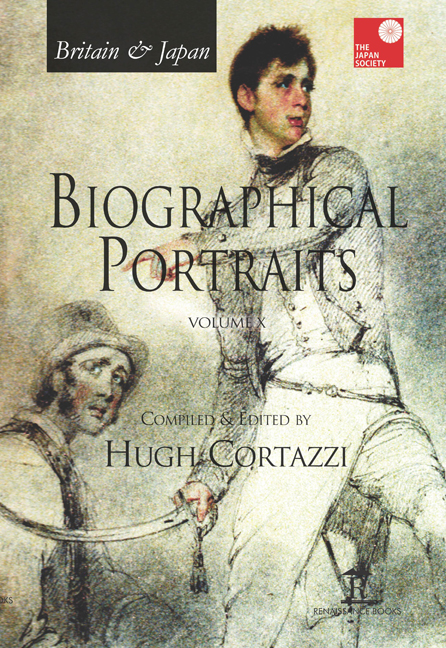Book contents
- Frontmatter
- Dedication
- Contents
- Introduction
- List of Contributors
- Index of Biographical Portraits in Japan Society Volumes
- PART I BRITAIN IN JAPAN
- PART II JAPAN IN BRITAIN
- Select Bibliography of Works in English on Anglo-Japanese Relations [Compiled by Gill Goddard – Retired East Asian Studies Librarian, University of Sheffield]
- Select Bibliography of Works in Japanese on Anglo-Japanese Relations [Compiled by Akira Hirano, SISJAC]
- Index
58 - Hagihara Nobutoshi (1926–2001): Internationalist
Published online by Cambridge University Press: 07 May 2022
- Frontmatter
- Dedication
- Contents
- Introduction
- List of Contributors
- Index of Biographical Portraits in Japan Society Volumes
- PART I BRITAIN IN JAPAN
- PART II JAPAN IN BRITAIN
- Select Bibliography of Works in English on Anglo-Japanese Relations [Compiled by Gill Goddard – Retired East Asian Studies Librarian, University of Sheffield]
- Select Bibliography of Works in Japanese on Anglo-Japanese Relations [Compiled by Akira Hirano, SISJAC]
- Index
Summary
EARLY LIFE AND EDUCATION
IN THE YEARS following the Second World War Hagihara Nobutoshi, an individual largely separate from formal university life, made a remarkable contribution to scholarly and cultural relations between Japan and Britain.
Hagihara Nobutoshi was born in the Asakusa (now Taitō) ward of Tokyo on 7 March 1926.1 His family was scarcely academic. His father had completed eight years of military service and later became a wholesale supplier of Japanese pickles. In Nobutoshi's early years the family moved twice within Tokyo as his father began to process pickles and ultimately to supply them to the Japanese army. In contrast Nobutoshi's mother had been a junior school teacher, and it was she who showed particular interest in her five children's education. Nobutoshi's early enthusiasms were for competitive swimming and baseball, although he later developed wider interests in reading and music. These interests were to continue throughout his adult life.
After studying at two public junior schools, in 1938 he entered the newly founded Tokyo Metropolitan Aeronautical Industry School, an institution, which reflected the military priorities of the time. Apparently Nobutoshi's father assumed that his eldest son would follow a military career. Nobutoshi completed four years study at this technical school before his parents encouraged him to take the entrance examinations for the prestigious Third Higher School in Kyoto. In 1942, he took these examinations but was unsuccessful. After two further years of study at a private middle school he gained entrance to the Science Section of the Third Higher School.
In 1945, like vast numbers of high-school students, Nobutoshi was conscripted to carry out factory work for the war effort. In July the Osaka factory where he worked was destroyed by American bombing; fortunately none of the Kyoto Higher School students were injured. When the war finally ended on 15 August Nobutoshi was deeply relieved, but he felt no sense of happiness or emancipation. In this changed atmosphere he transferred to the Cultural Section of the Higher School, and in a complex mood of uncertainty believed that works of classical literature were now necessities of life.
With three friends he jointly purchased ten volumes of Goethe’s collected writings from a second-hand bookshop. At this stage Nobutoshi’s main interests were in German literature and culture, and he showed no particular interest in Britain or its history.
- Type
- Chapter
- Information
- Britain & Japan Biographical Portraits Vol X , pp. 648 - 662Publisher: Amsterdam University PressPrint publication year: 2016

